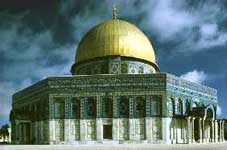"Say: He is Allah, the One! Allah, the eternally Besought of all! He begetteth not nor was
begotten. and there is none comparable unto Him." Surah al-Ikhlas (112:1-4).
Of course, the relationship between the Father and the Son were not patterned after the pagan gods who gave
birth to other gods. The Word, as the begotten Son, does not refer to begetting carnally. It refers
to divine personhood and its intellectual self-generation of thought and knowledge. It refers to the fact
that in the essence of Allah, there is a distinction between the Knower and the Known. What God as Knower knows
He knows through His own essence. God does not depend upon creation to possess knowledge.
Human beings are born into this world a blank slate, a tabula raza. We gain knowledge of
the world through our senses. And, if a particular sense is lacking, a person will not have a true
knowledge of that particular aspect of the world. For example, if a person were born blind, he or she will
not know color or the wonders of a beautiful sunset. So, for human beings, we gain knowledge of the world
through observation, studying, and experimentation.
By contrast, Allah does not gain knowledge of the world by learning through observation, studying, and
experimentation. Allah is the sole source of His own knowledge. For example, the mind of Allah knew
stars before there were any stars. Allah brought these stellar bodies into existence from the creative
genius of His own infinite mind and power. Allah said, 'Be' and they were. Allah did not say, 'Be,'
and then learn the nature of stars. Rather, Allah pre-knew the nature of stars and imparted their natures
to them when He created them.
So, human beings obtain their knowledge of the universe from the universe itself. Human knowledge comes
to the human mind from the universe via the senses. Divine knowledge of the universe finds its source in
the mind of Allah alone. Everything that Allah knows to exists, exists. Everything that Allah knows
not to exists, does not exist.
Analogously, the same type of relationship exists between a painter and an a person who merely views a
painting. The painter has a mental concept of the painting before the concept is generated on
canvas. By contrast, others who view the painting appreciate painter's skill by looking at the
painting. So, analogously, we gain our knowledge of the universe like a person viewing a painting.
While Allah, like a creative artisan, pre-knows everything before it even has existence. There is a
difference between the painter and Allah. The painter must use materials that are already in existence,
such as, paint, paper, pigments, and brushes. Allah says, 'Be,' and the objects of His creative Mind and
power are brought into existence.
Of course, it is important to note the essential difference between the painter and his painting. The
painter is of human essence while his paintings are of material essence. However, if the painter had a
son, they would both be of human essence. The Self and Al-Kalima of Allah are identically the same
essence. Therefore, the terms Father and Son are appropriate to describe the relationships within
divine personhood. Al-Kalima is One, Eternal, and Infinite. By contrast, human thought is only a
mental activity and not personhood itself.
In conclusion, the mind of Allah is its own source of knowledge. Therefore, it is appropriate to use
the terms, Begetter and Begotten of the personhood of Allah. This is because the Self of Allah begets or
generates its own Word or knowledge. Even before the creation of the universe, the Mind of Allah
contemplated and knew His own Being and personhood with perfect and complete knowledge.
The person who is the Begetter is the Father. The person who is the Begotten Word, Wisdom, and
Knowledge is the Son. The essence of Deity itself is totally the cause of its own infinite knowledge or
Al-Kalima. The Mind of Allah begets its own begotten Thought or Al-Kalima. Allah's infinite and
perfect knowledge is completely self-generated and not caused by another. Since both the Knower and
Known are the same essence, they are termed Father and Son.
"Among the terms employed in Scripture to designate the Second Person of the Blessed Trinity is the
Word (John 1:1). This is understood by St. Thomas of the Verbum mentale, or intellectual concept. As
applied to the Son, the name, he holds, signifies that He proceeds from the Father as the term of an
intellectual procession, in a manner analogous to that in which a concept is generated by the human mind in
all acts of natural knowledge. It is, indeed, of faith that the Son proceeds from the Father by a veritable
generation. He is, says the Nicaeno-Constantinopolitan Creed, begotten before all worlds". But the
Procession of a Divine Person as the term of the act by which God knows His own nature is rightly called generation.
This may be readily shown. As an act of intellectual conception, it necessarily produces the likeness of the
object known. And further, being Divine action, it is not an accidental act resulting in a term, itself a mere
accident, but the act is the very substance of the Divinity, and the term is likewise substantial."
From: "The Catholic Encyclopedia: The Blessed Trinity, (Section: Latin Theology: The Son)."
http://www.newadvent.org/cathen/15047a.htm#VI
Last edited 12/20/1999
Top of Page.
|
